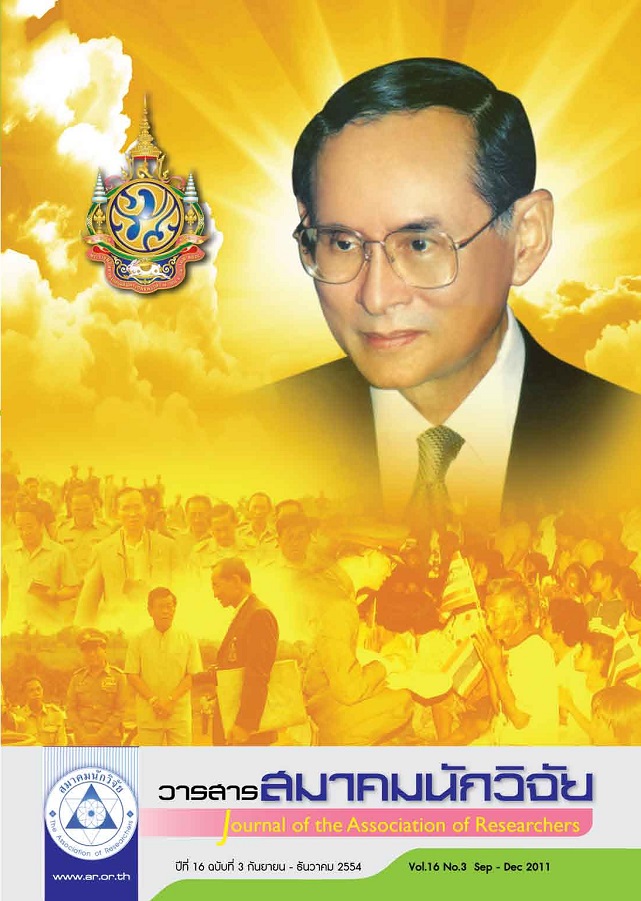knowledge creation in “kaset praneet” an agriculture model for sustainable development: a case study of the network of members of the local wisdom in buriram province
Main Article Content
Abstract
This paper investigated how farmers members of the Local Wisdom Network in Buriram
Province created and shared their knowledge of “Kaset Praneet” agriculture model (KP is the
agricultural model using small area of 1 rai to ensure the maximum productivity of the land
potentiality before expanding to normal-size of area for cultivation). The study examined the
interplay between tacit and explicit knowledge leading to the creation of 4 new knowledges
through four continuous processes: socialization (tacit to tacit), externalization (tacit to explicit),
combination (explicit to explicit) and internalization (explicit to tacit). These studies were
conducted using qualitative research; in-depth interviews, focus group discussion, participatory
observation during the years 2008-2010. The findings were shown that socialization occurred during
idea generation while externalization and combination occurred during the project development
phase. Internalization was clearly seen only in the phase of sharing and adopting among
community members and outsiders. It was also found that there were 3 models of knowledge
management in Kaset Praneet: Subsistence model, Surplus model and Advance model with their
differences in the advancement of levels of sustainability. Other findings from this paper pointed
out that the new knowledge in form of Kaset Praneet would be adopted and be practiced by the
community only if it was done through motivation activities together a strong leader.
Article Details
บทความที่ปรากฏในวารสารนี้ เป็นความรับผิดชอบของผู้เขียน ซึ่งสมาคมนักวิจัยไม่จำเป็นต้องเห็นด้วยเสมอไป การนำเสนอผลงานวิจัยและบทความในวารสารนี้ไปเผยแพร่สามารถกระทำได้ โดยระบุแหล่งอ้างอิงจาก "วารสารสมาคมนักวิจัย"
References
และตัวชี้วัด. นนทบุรี. มูลนิธิเกษตรกรรมยั่งยืน (ประเทศไทย).
บุญดี บุญญากิจ และคณะ. (2547). กรอบความคิดการจัดการความรู้. กรุงเทพฯ: สถาบันเพิ่ม
ผลผลิตแห่งชาติ.
ไพบูลย์ วัฒนศิริธรรม. (2547). การจัดการความรู้ กับการจัดการทางสังคม ใน ความรู้ท้องถิ่น: การ
จัดการความรู้สู่การจัดการทางสังคม. กรุงเทพฯ: วิทยาลัยการจัดการทางสังคม.
วิจารณ์ พานิช. (2549). การจัดการความรู้ฉบับนักปฏิบัติ. กรุงเทพฯ: สถาบันส่งเสริมการจัดการ
ความรู้เพื่อสังคม.
วิฑูรย์ เลี่ยนจำรูญ. (2535). เกษตรกรรมทางเลือก หนทางรอดเกษตรกรรมไทย. กรุงเทพฯ: สำนักพิมพ์
เกษตรกรรมทางเลือก.
สุทธินันท์ ปรัชญพฤทธิ์. (2550). การจัดการความรู้มหาชีวาลัยอีสาน. บุรีรัมย์: มหาชีวาลัยอีสาน.
เสรี พงศ์พิศ. (2549). เศรษฐกิจพอเพียง การพัฒนาที่ยั่งยืน. กรุงเทพฯ: สำนักพิมพ์พลังปัญญา.
อภิชัย พันธเสน . (2544). พุทธเศรษฐศาสตร์. กรุงเทพมหานคร: สำนักพิมพ์อมรินทร์.
อภิสิทธิ์ ธรรมรงวรางกูร. (2549). รายงานประจำปีโครงการพัฒนาชุมชนภาคอีสานเพื่อการเสริม
สร้างสุขภาพอย่างยั่งยืน. ขอนแก่น. มูลนิธิพัฒนาชุมชนอย่างยั่งยืน เพื่อคุณภาพชีวิตที่ดี
จังหวัดขอนแก่น.
Polanyi, M. (1966), “The Tacit Dimension, London: Routledge & Kegan Paul
Senge, P. M. (1990). The Fifth Discipline: The Age and Practice of the Learning
Organization. London: Century Business.
Nonaka, I. & Takeuchi, H. (1995). The Knowledge-Creating Company: How Japanese
companies create the dynamics of innovation. Oxford University Press. The USA.


